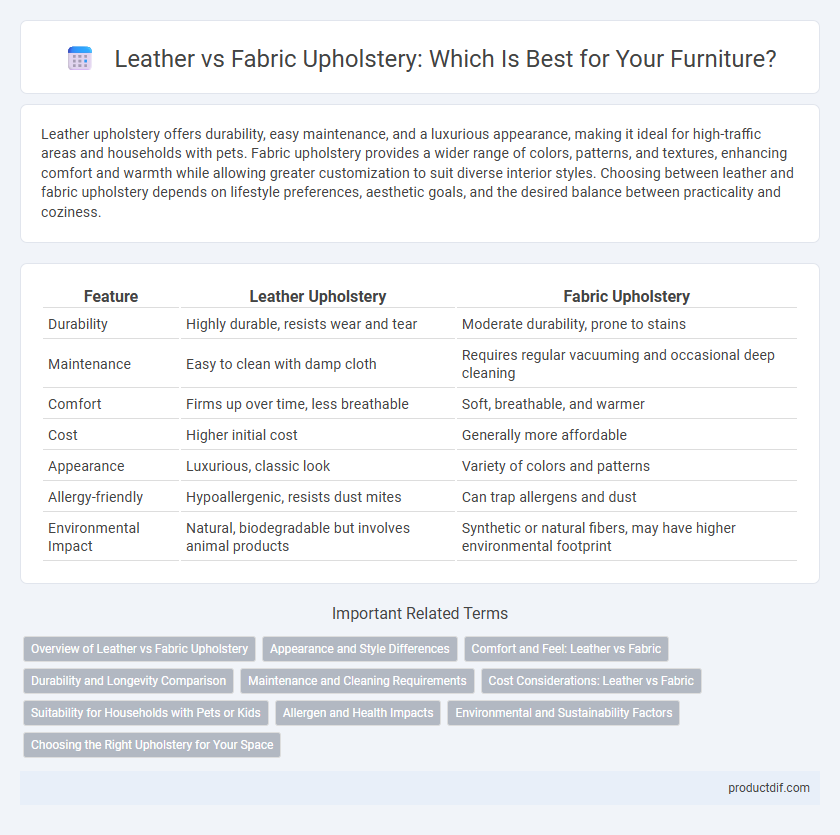Leather upholstery offers durability, easy maintenance, and a luxurious appearance, making it ideal for high-traffic areas and households with pets. Fabric upholstery provides a wider range of colors, patterns, and textures, enhancing comfort and warmth while allowing greater customization to suit diverse interior styles. Choosing between leather and fabric upholstery depends on lifestyle preferences, aesthetic goals, and the desired balance between practicality and coziness.
Table of Comparison
| Feature | Leather Upholstery | Fabric Upholstery |
|---|---|---|
| Durability | Highly durable, resists wear and tear | Moderate durability, prone to stains |
| Maintenance | Easy to clean with damp cloth | Requires regular vacuuming and occasional deep cleaning |
| Comfort | Firms up over time, less breathable | Soft, breathable, and warmer |
| Cost | Higher initial cost | Generally more affordable |
| Appearance | Luxurious, classic look | Variety of colors and patterns |
| Allergy-friendly | Hypoallergenic, resists dust mites | Can trap allergens and dust |
| Environmental Impact | Natural, biodegradable but involves animal products | Synthetic or natural fibers, may have higher environmental footprint |
Overview of Leather vs Fabric Upholstery
Leather upholstery offers durability, a sleek appearance, and easy maintenance, making it ideal for high-traffic spaces and modern decor. Fabric upholstery provides a wider variety of colors, patterns, and textures, enhancing comfort and customization for diverse interior styles. Each material impacts furniture longevity differently, with leather resisting stains and wear, while fabric may require more frequent cleaning and care.
Appearance and Style Differences
Leather upholstery offers a sleek, polished appearance with a smooth texture that enhances modern and classic furniture styles, providing a luxurious and sophisticated look. Fabric upholstery features a wide variety of patterns, colors, and textures, allowing for more customization and a cozy, inviting aesthetic suitable for casual or traditional decor. The choice between leather and fabric significantly impacts the visual appeal and overall ambiance of interior spaces, influencing style perceptions and design flexibility.
Comfort and Feel: Leather vs Fabric
Leather upholstery offers a smooth, cool surface that becomes more supple over time, providing a luxurious and durable feel ideal for those seeking a sleek aesthetic with easy maintenance. Fabric upholstery delivers a softer, warmer touch with greater breathability and a variety of textures and patterns, enhancing comfort in diverse climates. Choosing between leather and fabric hinges on personal preference for temperature sensitivity and tactile sensation, with leather excelling in elegance and durability, while fabric prioritizes coziness and customization.
Durability and Longevity Comparison
Leather upholstery offers superior durability and longevity compared to fabric, resisting wear, spills, and stains more effectively due to its dense surface and natural oils. High-quality leather can last 10-15 years or more with proper care, maintaining its appearance and structural integrity better than most fabrics. Fabric upholstery, while available in various textures and patterns, tends to absorb stains and shows signs of wear faster, often requiring replacement within 5-7 years in high-use environments.
Maintenance and Cleaning Requirements
Leather upholstery requires regular conditioning and wiping with a damp cloth to prevent cracking and maintain its smooth surface, whereas fabric upholstery needs frequent vacuuming and spot cleaning to avoid stains and dust accumulation. Leather is generally easier to clean from spills, as liquids tend to bead on the surface, while fabric absorbs liquids and may require specialized cleaning agents or professional care. Durability in maintenance favors leather for allergy sufferers due to its non-porous nature, while fabric often demands more intensive upkeep to keep it looking fresh and free of allergens.
Cost Considerations: Leather vs Fabric
Leather upholstery generally carries a higher upfront cost compared to fabric due to the quality of materials and durability. Fabric options offer more affordable pricing and a wider variety of patterns and textures, making them budget-friendly for diverse interior styles. Maintenance costs for leather can be lower over time because of its resistance to stains and wear, whereas fabric may require more frequent cleaning and potential replacement.
Suitability for Households with Pets or Kids
Leather upholstery offers superior durability and easy cleaning, making it highly suitable for households with pets or kids prone to spills and scratches. Fabric upholstery provides more comfort and variety in texture but tends to absorb stains and is harder to maintain in a busy home environment. Choosing leather often results in longer-lasting furniture that withstands active family lifestyles better than most fabric options.
Allergen and Health Impacts
Leather upholstery is hypoallergenic because it repels dust mites, pet dander, and other allergens, making it a healthier choice for individuals with allergies or respiratory issues. Fabric upholstery tends to trap allergens such as dust, pollen, and mold spores, which can exacerbate asthma and cause irritations. Regular cleaning is essential for fabric to minimize health risks, while leather requires less maintenance and promotes better indoor air quality.
Environmental and Sustainability Factors
Leather upholstery offers durability and natural biodegradability but involves environmentally impactful livestock farming and chemical tanning processes. Fabric upholstery, especially when made from organic or recycled fibers, generally has a lower carbon footprint and easier recyclability but may require synthetic materials that impact microplastic pollution. Choosing sustainably sourced leather or certified eco-friendly fabrics enhances environmental benefits while minimizing ecological damage.
Choosing the Right Upholstery for Your Space
Leather upholstery offers durability, easy maintenance, and a luxurious appearance, making it ideal for high-traffic areas or modern interiors. Fabric upholstery provides a wider range of colors, patterns, and textures, enhancing comfort and versatility in both classic and contemporary settings. Selecting the right upholstery depends on factors such as lifestyle, room function, and design preferences to ensure longevity and aesthetic harmony.
Leather Upholstery vs Fabric Upholstery Infographic

 productdif.com
productdif.com